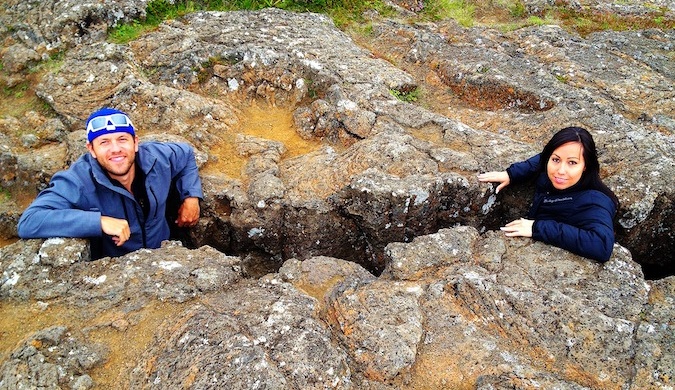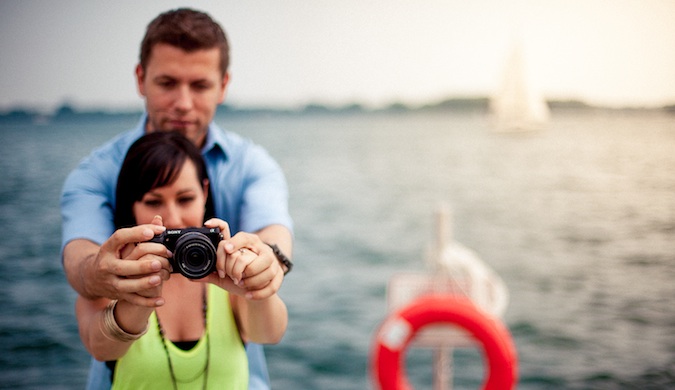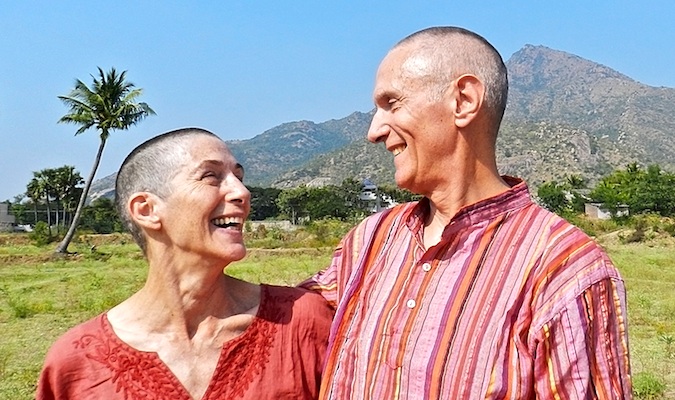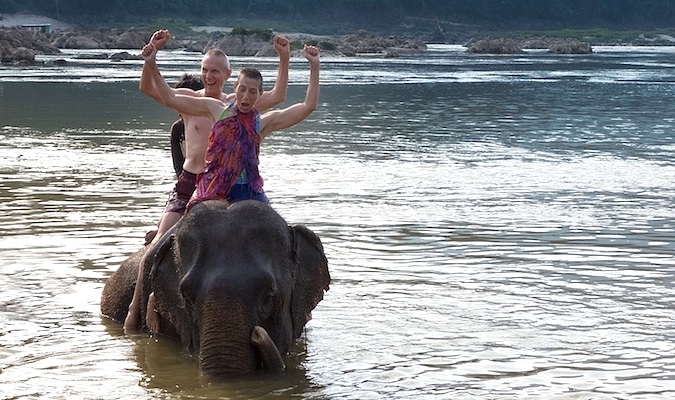
Greetings from somewhere still in Africa! I haven’t been eaten by a lion yet (thankfully). This week I am sharing stories of readers who used my tips and advice to realize their travel dreams. If you’ve been wondering how easy it is to replicate my advice, let these stories inspire and show you that the advice on this site can work for anyone!
Manny and Olivia are two 33-year-olds who lived the corporate lifestyle working as marketing managers for two of the biggest media/telecom conglomerates in Canada. In half a year, they saved $40,000 and quit their cubicle jobs to follow their passion for travel, writing, and photography. I wanted to interview these two because I believe it is important to show that even though I’m American, the money-saving advice I talk about is universal.
Nomadic Matt: Tell everyone about yourselves.
Manny and Olivia: We are both 33 years old and from Toronto, Canada. In half a year, we saved $40,000 and, on July 25, 2012, left Canada to start our trip around the world. We plan to be on the road for 14-18 months.
How did you find this website? I’m always curious.
Olivia: We first considered doing an around-the-world trip in October 2011. I mentioned it to a few close friends, and one of them, a big travel buff, mentioned that Nomadic Matt was a great resource. One look at the site and we understood why. It was really encouraging to see that we weren’t alone facing this choice and that other people out there such as you have successfully followed their passion. It became easier to plan everything and hesitation gave in to excitement.
What kind of trip did you plan?
Manny: We were planning a full around-the-world trip (with the exception of South America). Starting with Europe we would work our way west to east; Great Britain and Iceland to Western Europe, then Eastern Europe, Africa, India, Southeast Asia, Asia then Australia and New Zealand and finally the Trans-Siberian Railway through Russia. Hopefully we will end the tour with a trip to the Scandinavian countries, followed by Denmark and the Netherlands. We weren’t exactly sure how long it would take, but our initial calculations came in at just under two years.
 Were you afraid or nervous before you went on your trip? I was terrified.
Were you afraid or nervous before you went on your trip? I was terrified.
Olivia: Planning a world trip is very overwhelming, and it’s hard to anticipate issues that you may face and prepare for them in advance. Reading your experiences and “traveling” with you provides a bit of reassurance that things will work out, even if they don’t always work out exactly as you planned.
How did my site help you with your trip?
Olivia: When planning a big trip, especially one for over a year, you really need to budget, see what you can and cannot do. It’s hard to find good resources online that tell you what to expect to pay for simple things like food and local transportation. Your website saved us a lot of time and money, allowing us to budget properly using your Travel Guides and Travel Tips. We have recently become virtually addicted to your newsletter as we move forward in our journey.
Manny: When we decided to do a world trip we weren’t sure what to do with our stuff. Should we keep it? Store it? What about our house? A reality check came when we read your article on “How to Save Money for Your World Trip.” So to save money, not be stressed, and really live out our world experience, we sold our stuff, including our house and car, and took off.
 You saved a lot of money for your trip. How did you do it?
You saved a lot of money for your trip. How did you do it?
Manny: We created a spreadsheet that outlined average daily living expenses for each country and multiplied it by the number of days we would spend in each country. We factored in when we would be staying with family or friends, as well as transportation costs. We then added a 15% buffer, knowing full well that it’s next to impossible to stay right on budget. After averaging out the entire trip, we came to a daily expenditure amount: $100 CDN a day. We made sure to have very realistic expectations, knowing we would blow our budget in Western Europe and make up for it in Asia. While we were working on budgets, we began to tighten up on our spending, especially dinners and nights out. We did try to live off of one salary and bank the other. We put some money away in a high-yielding interest account and are using $40,000 of it for the trip.
Olivia: I also took on a number of different event-planning contracts on the side, working 18 hour days quite often. It wasn’t that easy, but it was manageable because we had a clear goal in mind. We made it a point to not dip into our overall savings or any money we made from the sale of our home or cars. This way we have no hesitation or regrets spending the money on our adventure and can actually enjoy it stress free. Within six months we were able to raise about $40,000. This allows us about 600 days of travel.
That’s a lot of travel! What about life on the road has surprised you the most?
Manny and Olivia: We are really surprised at how comfortable we can get in foreign locations and different beds every night. Another surprise is language barriers. This is often the worry of many travelers, but it becomes nonexistent when you actually start traveling. Sign language and different translator apps are actually more fun and add a new, funny dimension to common interactions.
Staying on budget can be a problem for a lot of people. How do you two stay on budget?
Manny: We have a spreadsheet where we keep track of every single expense. On one page we have categories such as restaurant, grocery, transport, entrance fees, gas, car, etc. One the next sheet we have totals for each category and then we average out the expenditures by days to see where we are at and if we need to start cutting back. We often share meals since general portions are gluttonously large. We gave up our home addictions to sweets and alcohol and thus cut another huge chunk of expenses. We don’t spend frivolously and actually rent fully equipped rooms for a little extra cost and buy groceries, thus saving a lot of money on food. We eat a lot less and healthier, since a lot of the foods we buy are fresh and we cook them ourselves.

What one thing that you thought would be a challenge has turned out not to be?
Olivia: I thought it would be a challenge to survive off such little clothing. It turns out I don’t even need all the things I brought. It’s easier to get by on fewer things so that repacking is fast and the backpack is lighter. I’m actually going to be ditching some clothing soon.
Manny: I thought it would be a struggle not to have a phone that keeps me connected with the outside world at all hours of the day and night the way I got used to in Canada. I’ve realized now, I prefer to be off the grid and connect with my inner self while discovering the beauty of nature on a daily basis instead.
Any parting words of advice to inspire others to follow in your footsteps?
Manny and Olivia: Since we started telling people about our trip we have encountered the exact same reactions — and these reactions have not changed throughout our trip. No matter what stage in life they are at, how rich or poor they may be, they all say “I wish I could do this, but I can’t because…” The “because” is usually followed by “I just bought a condo” or “ we are saving for a new car” or “I’m scared to leave my job.” It’s understandable that we all need money to survive, but there is no point in surviving if you aren’t going to live. Our one piece of advice is that once you are on a real trip, you will realize just how little you need, not just to survive, but to be truly happy. And that all of those possessions you keep amassing are just baggage. Anyone can do what we are doing, you have to just really want it and take a chance.
Become the Next Success Story
One of my favorite parts about this job is hearing people’s travel stories. They inspire me, but more importantly, they also inspire you. I travel a certain way but there are many ways to fund your trips and travel the world and I hope these stories show you that there is more than one way to travel and that is within your grasp to reach your travel goals. Here are more examples of people who gave up living a typical life to explore the world:
We all come from different places, but we all have one thing in common: we all want to travel more.


 How did you save money for your travels?
How did you save money for your travels?



